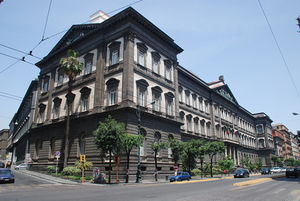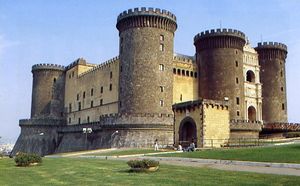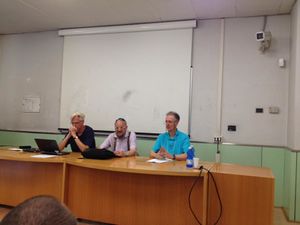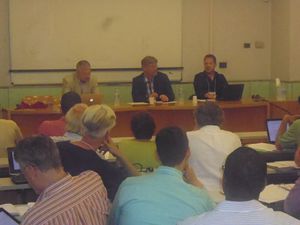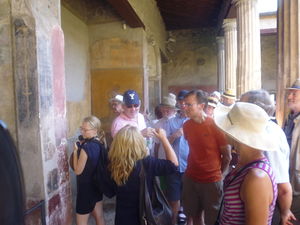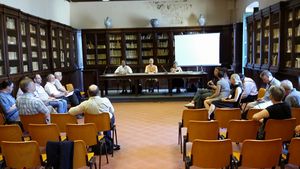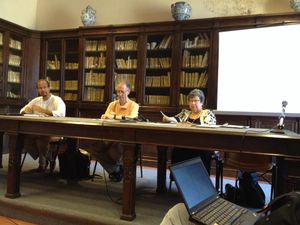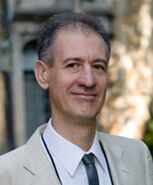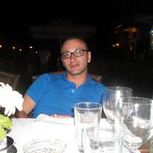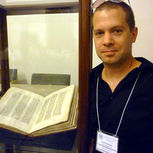Second Temple Jewish Paideia in its Ancient Near Eastern and Hellenistic Contexts / 5th Nangeroni Meeting (2015 Naples), conference
Second Temple Jewish Paideia in its Ancient Near Eastern and Hellenistic Contexts (2015) is the topic of the fifth conference in the series of Nangeroni Meetings organised by the Enoch Seminar in Naples, Italy (June 30 - July 4, 2015).
< ... -- Fourth Nangeroni Meeting (Milan 2014) -- Fifth Nangeroni Meeting (Naples 2015) -- Sixth Nangeroni Meeting (2016) -- ... >
Fifth Nangeroni Meeting (Naples, Italy; June 30 - July 4, 2015)
Conference Committee: Gabriele Boccaccini, Luca Arcari, and Jason M. Zurawski
in collaboration with the University of Naples Federico II and the FIRB Project (Director, Luca Arcari)
Preliminary Information
When: June 30 - July 4, 2015
Location of Seminar: Naples, Italy
Purpose: This Nangeroni Meeting and the resultant volume will examine the diverse understandings of Jewish paideia during the Second Temple period in light of both the Ancient Near Eastern and Greco-Roman backgrounds. What did Jewish education look like in Palestine? And in the Hellenistic Diaspora? What was the role of the Mosaic Torah? What about Greek encyclical education? How did ANE and Ancient Canaanite educational practices influence later traditions? How did Second Temple Jewish education influence the adoption of Greek paideia in Late Antique Christianity? These and other questions will be investigated. We plan to have panels on the following topics: Education in Ancient Mesopotamia and Egypt, Education in Ancient Israel and Judah to the Persian Period, Jewish Education at Qumran & Palestine, Hellenistic Paideia in Alexandria, Early Jewish Hellenistic Paideia, Jewish Hellenistic Paideia in the Roman Period, and the Legacy of Jewish Paideia in the Early Christian and Rabbinic Traditions. The central purpose of discussing these topics is to move towards a greater overall understanding of the unique Jewish views on education during the period. This has been a surprisingly neglected aspect in the field, and it is our hope to begin a more thorough conversation about this crucial topic.
Submission: Major papers (5000-8000 words) and short papers (3000-4000 words) should be submitted by May 1, 2015, so as to allow respondents and the other participants sufficient preparation time.
Proceedings: A volume will of select papers from the Meeting, revised in light of the seminar, will be published.
Accommodations
Conference site
- The historical palace of the Library of Humanities at the University of Naples Federico II.
Accommodations
- The 4-star Hotel Naples
Registration
Participation in the Fifth Nangeroni Meeting is by invitation only. If you are interested in joining the meeting, please contact the organizers.
Program
- All sessions from Tuesday to Friday will be held at the Department of Humanities at the University of Naples, Federico II (Via Nuova Marina 33, room A6), around the corner from Hotel Naples. Saturday’s sessions will be at the medieval castle, Maschio Angioino.
- Breakfasts are at Hotel Naples (Corso Umberto I, 55)
- Lunches are catered at the University (Via Nuova Marina 33, 7th floor, aula 710)
- Dinners are held at the restaurant La Piazzetta (Via Nuova Marina 30)
Tuesday, June 30
Arrivals
17:00 -- Opening Session & Welcome
17:30-19:00 -- Session 1: EDUCATION IN ANCIENT MESOPOTAMIA
- Steve Tinney, “Education in Ancient Mesopotamian”
- Introduction: Steve Tinney (10 min.)
- Response: William Schniedewind (10 min.)
- Moderated Discussion: 70 min.
19:30 -- Dinner
Wednesday, July 1
7:00-8:45 -- Breakfast
9:00-10:30 -- Session 2: EDUCATION IN ANCIENT ISRAEL ()
- William Schniedewind, “Education in Ancient Israel and Judah into the Persian Period”
- Introduction: William Schniedewind (10 min.)
- Response: Steve Tinney (10 min.)
- Moderated Discussion: 70 min.
10:30-11:00 -- Coffee Break
11:00-12:30 -- Session 3: SECOND TEMPLE PALESTINIAN EDUCATION I
- Matthew Goff, “Students of God in the House of Torah: Education in the Dead Sea Scrolls”
- Introduction: Matthew Goff (10 min.)
- Response: Francis Borchardt (10 min.)
- Moderated Discussion: 70 min.
12:30 -- Lunch
14:30-16:00 -- Session 4: SECOND TEMPLE PALESTINIAN EDUCATION II
- Frank Ueberschaer, “Jewish Education in Ben Sira”
- Introduction: Frank Ueberschaer (10 min.)
- Response: Greg Goering (10 min.)
- Moderated Discussion: 70 min.
16:00-16:30 -- Coffee Break
16:30-18:00 – Short Paper Session I
Group A -- Jewish Hellenistic Paideia
- Sean Adams, “Philo’s Questions and the Adaptation of Greek Literary Curriculum”
- Anders Klostergaard Petersen, “Dissolving the Philosophy Religion Dichotomy in the Context of Hellenistic Jewish Paideia: Wisdom of Solomon, Philo, and 4 Maccabees”
Group B -- Proverbs and Paideia
- Greg Schmidt Goering, “Tactile Discipline as Sapiential Paideia in the Book of Proverbs”
- Jacqueline Vayntrub, “Mashal Performance and the Idea of Ancient Israelite Education”
19:30 -- Dinner
Thursday, July 2
7:00-8:45 -- Breakfast
9:00-10:30 -- Session 5: JEWISH HELLENISTIC PAIDEIA I
- Benjamin Wright, “Greek Paideia and the Jewish Community of Alexandria in the Letter of Aristeas”
- Introduction: Benjamin Wright (10 min.)
- Response: Gabriele Boccaccini (10 min.)
- Moderated Discussion: 70 min.
10:30-11:00 -- Coffee Break
11:00-12:30 -- Short Paper Session II
Group A -- Ben Sira and Paideia
- Samuel Adams, “Reassessing the Exclusivism of Ben Sira's Jewish Paideia”
- Elisa Uusimäki, “Wisdom as a Way of Life: The Formation of a Sage according to Ben Sira”
Group B -- Jewish, Christian, and Pagan Paideia
- Luca Arcari, “The Testament of Orpheus, Aristobulus and the Derveni Papyrus. Between ‘didactic’ hymnography and exegetical activity”
- Kathy Ehrensperger, “Paul’s Paideia and his Role as a Teacher of the Nations in Christ”
- Jason von Ehrenkrook, “Christians, Pagans, and the Politics of Paideia in Late Antiquity”
12:30 -- Lunch
14:00 -- Afternoon trip to Pompeii (depart from Hotel Naples)
20:00 -- Dinner
Friday, July 3
7:00-8:45 -- Breakfast
9:00-10:30 -- Session 6: JEWISH HELLENISTIC PAIDEIA II
- Gregory Sterling, “Jewish Hellenistic Paideia in Philo of Alexandria”
- Introduction: Gregory Sterling (10 min.)
- Response: Sean Adams (10 min.)
- Moderated Discussion: 70 min.
10:30-11:00 -- Coffee Break
11:00-12:30 -- Short paper session III
Group A -- Qumran and Paideia
- Francis Borchardt, “The Temple Scroll in the Context of Hellenistic and Graeco-Roman Scholarly Texts”
- Jim Charlesworth, “Educating the Sons of Light from the Hodayot Poetic Visions of Suffering and Elevation: Imitating Luminaries”
Group B -- Paideia and the Family
- Patrick Pouchelle, “Paternal Upbringing in the Pseudepigrapha”
- Paolo Collini, “A Reading of sublemma ‘Education of Children’ from the Volume ‘1. Famiglia’ of the CIMJ”
- Brian Capper, “Agrarian Society and the Call of Education: The Essenes, Poverty and Socio-Economic Equilibrium in Early Roman Judaea”
12:30 -- Lunch
14:00-17:00 -- Visit to the Archaeological Museum
17:30-19:00 – Session 7: EARLY RABBINIC EDUCATION
- Daniel Boyarin, “Between Rabbis—And Other Jews: Some Martyr Tales”
- Introduction: Daniel Boyarin (10 min.)
- Response: Anders Klostergaard Petersen (10 min.)
- Moderated Discussion: 70 min.
19:30 - Dinner
Saturday, July 4
7:00-8:45 -- Breakfast
9:00-11:30 -- Session 8: GREEK AND JEWISH PAIDEIA IN 4 MACCABEES (Maschio Angioino)
- David deSilva, “The Author of 4 Maccabees and Greek Paideia: Facets of the Formation of a Hellenistic Jewish Rhetor”
- Tessa Rajak, “Promoted Paideia in 4 Maccabees”
- Introduction: David deSilva (10 min.)
- Response: Tessa Rajak (10 min.)
- Moderated Discussion (50 min.)
- Pause (10 min.)
- Introduction: Tessa Rajak (10 min.)
- Response: David deSilva (10 min.)
- Moderated Discussion (50 min.)
11:30-12:20 -- Closing thoughts. Future directions
Departures
Participants
- Samuel Adams*
- Sean Adams*
- Luca Arcari*
- Gabriele Boccaccini*
- Francis Borchardt*
- Daniel Boyarin*
- Brian Capper*
- James Charlesworth*
- Paolo Collini*
- David deSilva*
- Kathy Ehrensperger*
- Gregory Goering*
- Matthew Goff*
- Robert Hall*
- Vered Hillel*
- David Jackson*
- Anders Klostergaard Petersen*
- Patrick Pouchelle*
- Tessa Rajak*
- William Schniedewind
- Gregory Sterling*
- Steve Tinney*
- Frank Ueberschaer*
- Elisa Uusimaki*
- Jacqueline Vayntrub*
- Jason von Ehrenkrook*
- Benjamin Wright*
- Jason Zurawski*
Facilities & Accommodations
Accommodations
Hotel Naples
Corso Umberto I, 55
80138 Napoli
Seminar locations
Department of Humanities
Federico II University
Via Nuova Marina 33
And, Maschio Angioino (Saturday meetings)
Getting to the Site
From Airport
Via Bus
From Terminal 1, "Alibus" to city centre (see map), every 20 minutes. Journey takes about 30 minutes.
Take to stop, "Molo Beverello / Piazza Municipio."
From there, you can walk to Hotel Naples (~10 minutes, see map), or take a short taxi.
Via Taxi
The taxi stand is outside of terminal 1. Make sure to take a licensed taxi and to negotiate a fixed rate prior to accepting (should be between 15-25 euros).
From Train Station
Via Taxi
Best to just take a taxi. Again, make sure to take a licensed taxi and negotiate the fare first. It should be no more than 20 euros.
